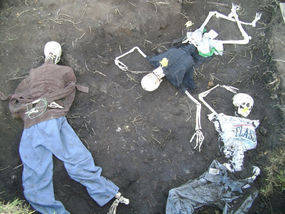Forensic Archaeology Job Description
Forensic Archaeology Degree
|
Get FREE Info From Schools |
Read our forensic archaeology job description to learn what they do. We then rate online and campus forensic archaeology schools and degrees.
Precision, care, and an extraordinary attention to detail: these are three of the foundations of forensic trained archaeologists .
Whereas standard archaeologists spend time excavating sites to unearth clues about the lives and interactions of people from long ago, the forensic archaeologist is employed to dig up information about potential crime scenes for the criminal justice system.
This criminal justice specialty that covers a great many different activities and tasks. The archaeologist must be ready to perform any of these at any time, so the education and training for this profession is fairly intense.
Only by having a firm grasp on both the worlds of criminal justice and that of the techniques involved with identifying people and incidents of the past, will the forensic archaeologist be able to do the job right.
Its a complicated job, but an exciting and rewarding one as well. Without the forensic archaeologist, who can tell how many murders or missing persons cases would have gone unsolved
Forensic Archaeology Job Description
As mentioned, the forensic archaeologist is responsible for a great many tasks. While all of them involve the discovery of objects from the past, they may be presented in a variety of ways.
Here are the most common job responsibilities of forensic archaeologists:
 |
- Investigating small items potentially buried by victims or perpetrators to be used as evidence in court
- Locating and recovering human remains at potential grave sites
- Examining areas above the surface where bodies have been disposedunder branches or leaves, in closets or basements, beneath sheets or boards
- Recovering remains or identifying victims in a mass grave
Where Do Forensic Archaeologists Work?
 |
Beyond these tasks, a forensic archaeologist may even be called upon to do work for civil cases. Especially in disputes over boundary issues, the archaeologist can be helpful in locating buried lines or landmarks and determining border limits.
Like many jobs in the criminal justice world, this profession can work in either the public or private sector. In the public, he or she can be a member of the FBI, CIA, NSA, or other federal and local law enforcement agencies.
In the private sector, the forensic archaeologist can be employed by law firms, corporations, or other people who need to uncover the truth. Naturally, the salary for working in the private sector is higher than those who are being paid by the government.
Getting Your Forensic Archaeology Degree
Because the forensic archaeologist needs to be so well versed in not only human anatomy, but also anthropology and criminal investigation, the time it takes to become properly trained and educated can be a bit long. This is definitely a vocation for dedicated and focused individuals.
The first thing to do is get your degrees. For the best jobs in this profession, youll want:
- Bachelors Degree Biosciences, Forensics, or Archaeology
- Masters Degree Forensic Archaeological Science
- PhD Biological or Forensic Archaeological Science
These can be earned from most schools in the country, but your best bet may be to take online courses for your Bachelors and Masters degrees. That way you can make your transition to a new career as smoothly as possible by keeping your day job and learning from a home computer.
Once youve received your collegiate and post-collegiate education, you have to become certified by the American Board of Forensic Anthropology. It also wouldnt hurt to join the American Academy of Forensic Scientists.
The more credentials you have, the better your job in the world of forensic archaeology will be.
|
Get FREE Info From Schools |
Return from Forensic Archaeology to Forensic Jobs
Return from Forensic Archaeologists to Criminal Justice Careers





